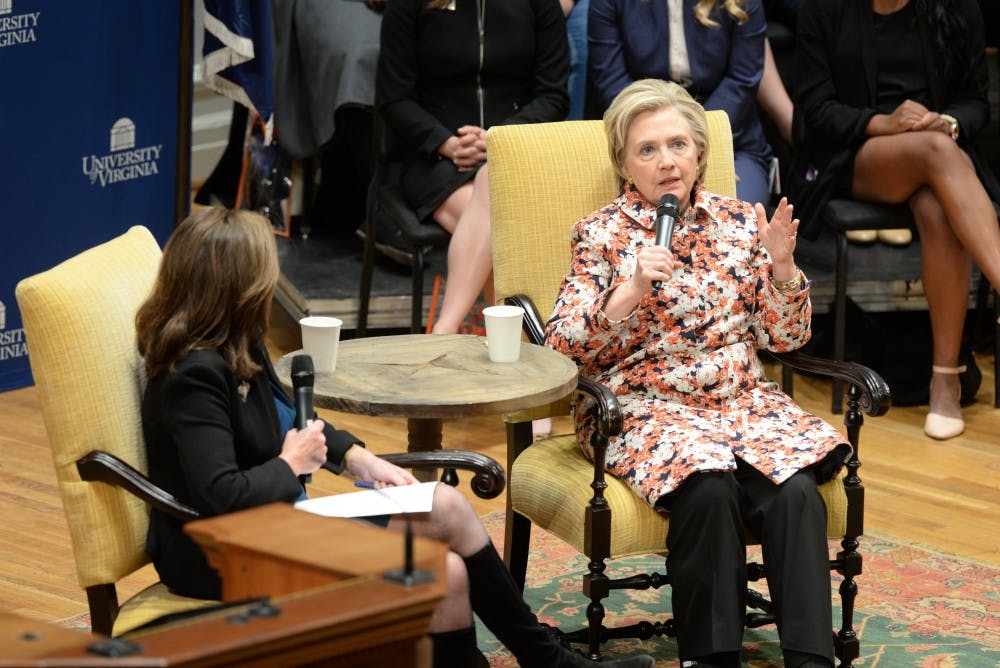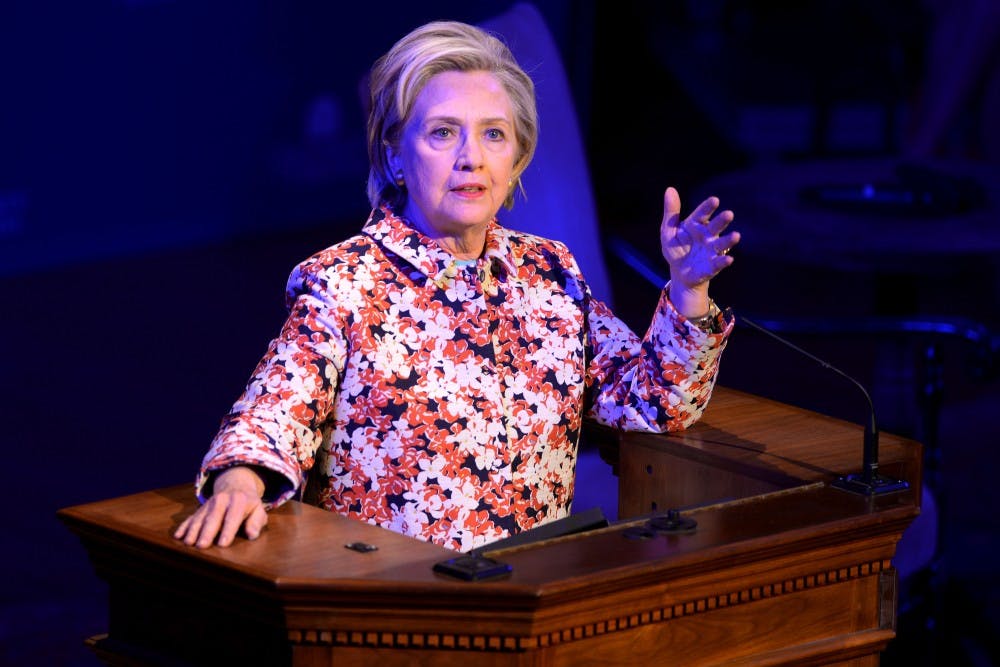Former Secretary of State Hillary Clinton was warmly welcomed to Grounds Tuesday afternoon with a standing ovation to deliver the closing remarks for the Women’s Global Leadership Forum, hosted by the University’s Morven Programs. Her speech was titled, “Women and 21st Century Democracy: The Path Forward.”
The auditorium of Old Cabell Hall, which seats about 850 people, was nearly filled to capacity.
Virginia Gov. Terry McAuliffe (D) highlighted the various leadership roles Clinton has held in his introduction of her. Clinton was most recently the Democratic nominee during the 2016 presidential election and the first woman to run as a major party’s candidate for the White House. Clinton has also been the first lady of Arkansas, first lady of the United States and a U.S. senator from New York.
“This woman has been an advocate her entire life for women and children,” McAuliffe said. “As Secretary of State, her voice was always heard all around the globe. She has been a trailblazer her entire life.”
Clinton gave her own remarks about women’s leadership before sitting down with Virginia first lady Dorothy McAuliffe for an interview session. The audience and the press did not have the opportunity to ask Clinton any questions.
“Now, leadership is not just in politics,” Clinton said. “Leadership is also necessary in the private sector, in academia, in media, in your community life. Everywhere we go in a democracy, we expect people to help lead us.”
Clinton focused on the sexism and “excruciating” double standards that women in leadership roles, particularly in politics, face. She said she doesn’t know a woman in politics who has not been questioned and judged, and that women who try to break through male-dominated politics are often judged against themselves.
“The more professionally successful a man is, the more likeable he is,” Clinton said. “The more professionally successful a woman is — not so much. This has been proven over and over again. It’s still kind of depressing to think about.”
Although the double standards for women in politics are “alive and well,” Clinton suggested a possible solution for eliminating sexism in the future.
“The only way we’re going to get sexism out of politics is to get more women into politics,” Clinton said. “Because then maybe it won’t be so difficult. There will be different sizes. Women with different hairstyles. All of the criticism and the resentment and the fears will not just be focused on whoever this one woman might be.”
Clinton also mentioned how citizens say they would support female candidates — they’d vote for a woman, just not “that woman,” she said in reference to herself. However, she noticed that after the election, once she was out of the spotlight, the rhetoric towards women didn’t change.
“All of sudden, I started seeing these same people in the press, in politics, start attacking other women,” Clinton said.
Clinton discussed how U.S. Sen. Elizabeth Warren (D-Mass.) began reading a letter written by Coretta Scott King on the Senate floor in protest of Jeff Sessions’ nomination for attorney general and being told to stop. One of Warren’s male colleagues, Sen. Jeff Merkley (D-Ore.), read the same letter out of solidarity for her but was not told to sit down.
“I was in the Senate for eight years,” Clinton said. “I never remember anything like that happening.”
Clinton also referenced how Kamala Harris (D-Calif.) was told by the chair of the Senate Intelligence Committee, Sen. Richard Burr (R-N.C.), to cease questioning Sessions during his hearing because of the way she was interrogating him.
She said these instances, and others like them, are tactics used to “diminish” women to prevent them from “seeking and obtaining positions of leadership.”
“Women in particular — regardless of your partisan political stance — need to accept the fact that the diminishment of any woman is a diminishment of you,” Clinton said.
Although Clinton focused her speech primarily on women and democracy, she weaved promotions for her new book, “What Happened” and jabs toward President Donald Trump throughout.
She said her book was “painful” to write, at first, but turned out to be “cathartic.”
“I’m not going to sugarcoat it,” Clinton said. “I was devastated by the outcome of the election. I didn’t think I was going to lose. I didn’t think it was going to happen. I didn’t prepare a concession speech.”
Despite losing the election, Clinton said “the current occupant of the Oval Office and the press seem to think I’m the president anyway,” in one of many quips she made with regard to the Trump administration. Health care, Trump’s “stalking” during the 2016 election’s town hall-style debate, Trump’s insistence that Russia did not interfere in the election and his use of “alternative facts” were among some of the other topics Clinton discussed.
“When a leader tells you something contrary to what you can see with your own eyes — like the size of an inauguration crowd — the first time you think, ‘Well that’s just weird,’” Clinton said. “When it keeps happening, then those of you that study history know that trying to blur the line between fact and fiction is what dictators and authoritarians do.”

Dorothy McAuliffe ended the discussion by thanking Clinton for continuing to speak up.
“You could be playing with Aidan and Charlotte [Clinton’s grandchildren] right now and have your foot up on a stool, but that’s not you,” McAuliffe said. “We’re very grateful for you being here and for all your contributions, and we’re looking forward to the future.”
The two-day forum began Monday and was held in conjunction with the University’s Bicentennial celebration, which officially launched Oct. 6. The forum featured a number of panels — including one that addressed health and education challenges for women — and a keynote address given by U.S. Sen. Shelley Moore Capito (R-W.Va.).
Tickets for Clinton’s address were available through a lottery for University students, faculty and staff. There were also remote viewing sites for the event located in the Newcomb Hall Theater and the Jefferson School African-American Heritage Center.
According to The Daily Progress, Clinton did not receive a speaking fee for the forum, but speakers, including Clinton, will be reimbursed for travel and lodging.





